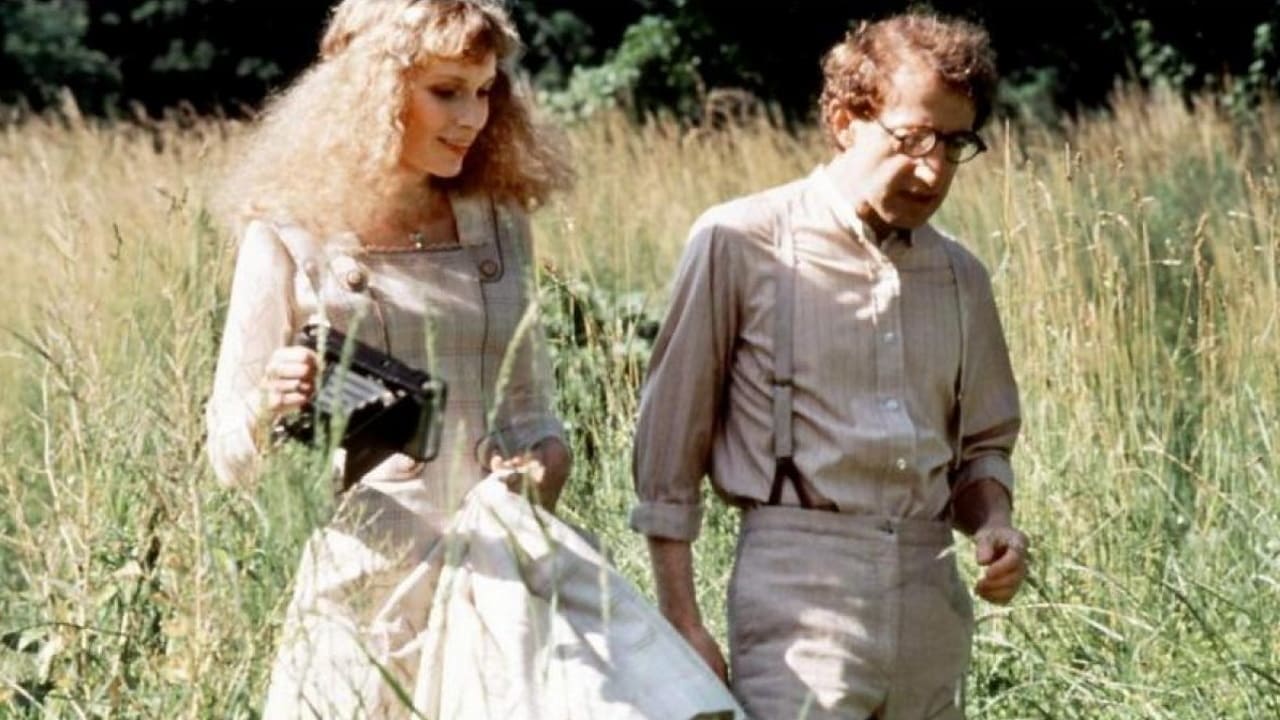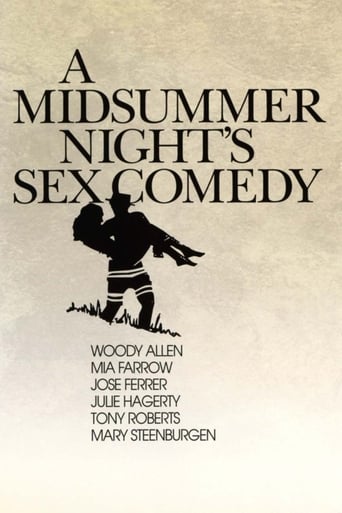



Wonderful character development!
What a waste of my time!!!
I cannot think of one single thing that I would change about this film. The acting is incomparable, the directing deft, and the writing poignantly brilliant.
View MoreThe film makes a home in your brain and the only cure is to see it again.
View MoreFalling between films such as "Manhattan" (1979), "Stardust Memories" (1980), "Zelig" (1983), "Broadway Danny Rose" (1984), and "The Purple Rose of Cairo" (1985), "A Midsummer Night's Sex Comedy" (1982) might come off as a mediocre minor work in the oeuvre of director Woody Allen. The film presents the director's usual themes, style, and narrative without developing them into anywhere near the insights of, say, the subsequent "Zelig". Nonetheless, "A Midsummer Night's Sex Comedy" offers a pleasant viewing experience for any Woody Allen fan as well as those who appreciate subtle comedy which puts more emphasis on the matters of the heart and the intellect rather than those of mere physique. The story, lending little more than the idea of blending relationships from William Shakespeare's most-celebrated comedy "A Midsummer Night's Dream" (1590-7), concerns an inventor (Woody Allen) and his wife (Mary Steenburgen), whose sex life has been suffering recently, who invite two couples to their summer residence: a professor who despises metaphysics and theology (Jose Ferrer) and his wife-to-be (Mia Farrow), who had a budding relationship with the inventor in the past, and a physician who is more open-minded when it comes to philosophical questions (Tony Roberts) and his young expendable sweetheart (Julie Hagerty). This simple set-up offers many directions for a comedy of errors, misunderstandings, and changes of heart which Allen develops in his usually amusing and stimulating fashion. Although the story and its events may not bear that many resemblances to those of Shakespeare's play, one is enticed to look for them from the moment one hears the music of Felix Mendelssohn, who composed the most famous music for the play in question in the 19th century. The most striking similarity is that both the film and the play portray characters who escape into nature where they are subjected to the powers of the heart or, alternatively, of the subconscious. What is more, both the play and the film juxtapose reason and emotion (or imagination) in the drama. In Shakespeare's play, the city which the lovers escape from represents reason and its domination over emotion, whereas the forest with fairies and magic represents emotion and its freedom from or, possibly, domination over reason. In Allen's film, this juxtaposition is captured by the character of the arrogant, naturalist-minded professor (whose counterpart in Shakespeare's play might be Egeus or Theseus), representing reason, and the other characters and the surrounding natural milieu, representing the powers of emotion. As Allen's narrative playfully takes sides with the latter, the spectator witnesses the inventor's discovery of a machine which allows to peek into the super-sensible world with spirits from the past. Above all, Allen's "A Midsummer Night's Sex Comedy" tackles the ancient theme of lust versus love. Other characters contemplate whether love without lust is possible, others whether lust without love is. This theme can, obviously, be seen as a development on the theme from Shakespeare's play. One of the film's greatest strengths is its subtlety which is a common denominator in Allen's comedy. Allen's extensive use of the off-screen space, the long take, and the mobile camera constantly imply that there is more than the eye can see. This gives elegance to the cinematic expression while also articulating the central theme of the film. Overall, like Shakespeare, Allen is able to use multiple sources, ideas, and themes to concoct an amusing and intellectually as well as emotionally stimulating piece of cinema which lasts with its viewer. Maybe not as sharply and distinctly as "Zelig" or "Manhattan", but it can be dug up every once in a while.
View More"A Midsummer Night's Sex Comedy" is, in my opinion, an improvement over Woody Allen's previous effort, "Stardust Memories", chiefly because Woody seems more sure of himself here; "Stardust Memories" was essentially all about his indecisiveness about whether he wants to make serious or funny films; with "Sex Comedy" he settles down to a strategy: a comedy with serious themes - a strategy that has since become his trademark. This movie has a couple of very funny scenes, but it also examines marital problems, love at first sight, missed opportunities, pragmatism vs. metaphysics, the possibility of an afterlife, etc. Above all, it succeeds in transporting the viewer to a different place and time - it feels like a vacation from the noise of modern cinema. Allen's usually right-on-target instinct about the music and the casting of his movies is in full evidence here, with him and Mia Farrow quickly developing the kind of connection that he only had with Diane Keaton in his previous films; Mary Steenburgen is amazingly lovely as his on-screen wife. But the real stars of this movie may be the beautiful locations where it was filmed, and Gordon Willis' cinematography which memorably captures that beauty. *** out of 4.
View MoreA Midsummer Night's Sex Comedy (1982) A Midsummer Night's Sex Comedy (1982) was written and directed by Woody Allen. Allen also stars in his iconic role as a more-or-less decent guy with the ability to say or do the wrong thing in almost any situation. Woody has surrounded himself with talent in this film. Jose Ferrer plays the pompous professor Leopold, and Tony Roberts plays the "fast" doctor Maxwell, who is Allen's best friend. The real clout comes from the female actors: Mia Farrow is Ariel--engaged to Leopold, but maybe in love with Woody, or maybe even with Roberts. Julie Hagerty plays Dulcy, a young but not-so-innocent nurse who has accompanied Maxwell for the weekend. Mary Steenburgen portrays Allen's wife Adrian, who has become frigid for reasons that she knows but we don't.Shakespeare realized the potential of midsummer's night for fantasy and for love, and so did Ingmar Bergman in his film "Smiles of a Summer Night." Allen has never been afraid of taking on a challenge, and he maintains the tradition with a script where almost every man wants almost every woman, and vice-versa. The film is all about love, and all about sex. However, because it's rated PG-13, you know that there won't be any on-screen nudity. Actors talk about sex, they arrange secret meetings and talk about sex some more, but we never see them without multi-layered early-1900's clothing. That's OK--this movie is about the chase, not the consummation.The film contains some beautiful scenery, so it would work marginally better on a large screen, but it was certainly satisfactory on DVD. Incidentally, the soundtrack is composed entirely of music by Felix Mendelssohn. You may not realize that Mendelssohn's incidental music for A Midsummer Night's Dream contains a melody we hear all the time. You'll recognize it instantly.
View MoreI think I see what Woody Allen was getting at here -- a kind of salubrious combination of Shakespeare's "A Midsummer Night's Dream" and Ingmar Bergman's "Smiles of a Summer Night." A handful of real or aspiring intellectuals spend a weekend in a country estate just after the turn of the last century. (And what a cast they are!) Some of them know one another and others are strangers.All are distinguishable in one way or another. Jose Ferrer is the snooty man of science who doesn't believe in spirits or spiritual lives. Tony Roberts is the naturalist and doctor who is more interested in leaves than science. Mia Farrow is Ariel (another nod to Shakespeare), an old love of Allen's who is about to marry the older Ferrer on Monday. Mary Steenburgen is Allen's wife who is concerned that their marriage is going stale and asks the other women about the best way to please a man in bed. Roberts falls for Farrow. So does Allen. Ferrer wants to make it with Julie Haggarty. Assignations are clumsily arranged and then fall apart for one or another reason. The guests see visions of fairies when they stare at a spirit ball. Globular lights dance around among the trees.Well, I'm all for enchanted forests. The folklore of northern Europe is itself enchanted. "Fairy rings" formed of mushrooms and all that.That this movie didn't work for me -- it might well work for others -- is because I simply couldn't care about any of the characters. And the conversational exchanges were only mildly comic. Without characters to care about, lacking a winsome sweetness, and without real laughs, what's left? The usual congeries of Allen's neurotic New York intellectuals falling in love with the wrong people and at odds with one another.Best performance -- and best scene -- go to Jose Ferrer singing lugubrious German Lieder while Steenburgen pounds on the piano. Woody has the good sense to look at the camera (twice) with a mournful expression.But the story is more confusing than enchanting. I understand Woody wrote the screenplay in two weeks, and I believe it.
View More